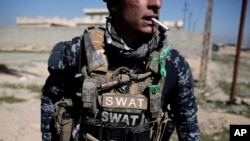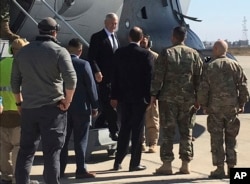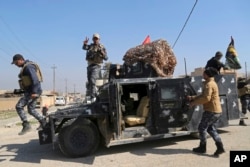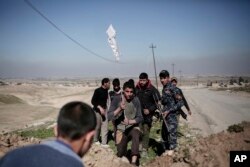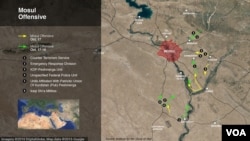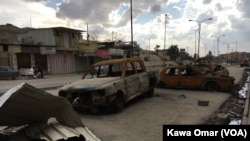The battle for Mosul has been bloody and slow — for Iraqi soldiers and civilians alike.
Since Iraqi forces launched an assault to retake the city, Islamic State’s last major urban stronghold in the country, last October, Iraqi troops have had to endure rockets and mortars, suicide-bombings and sniper fire, as well as unconventional small drone attacks.
With Iraqi forces now focused on the western half of the city after a months-long slog to secure east Mosul, questions about what will happen to the city after IS fighters have finally been ousted are becoming more urgent.
Added to the concerns about how Mosul will be governed, and how sectarian groups can be reconciled, are questions about what will happen to IS.
Earlier this week, U.S. officials, including Secretary of Defense Jim Mattis, made clear to reporters in Iraq that there won't be a hasty withdrawal of more than 9,000 American and coalition forces from the country after Mosul’s capture.
"I think the government of Iraq realizes it's a very complex fight and they need the assistance of the coalition even beyond Mosul," Lt. Gen. Stephen Townsend, commander of the joint task force task charged with coordinating anti-IS coalition forces, told reporters in Baghdad.
“The Iraqi political leadership recognize what they are up against and the value of the coalition,” Mattis said at a news conference.
Coalition power
The value of the coalition has been demonstrated in the battle for Mosul. The coalition has carried out thousands of air strikes on IS targets and trained tens of thousands of local ground forces, Iraqi and Kurdish. In the push for the densely populated west Mosul, coalition "advisers" are taking on more frontline roles — especially when it comes to directing airstrikes in order to minimize civilian casualties.
No one expects IS to disappear after losing Mosul. And coalition counter-insurgency expertise could well prove crucial.
Kurdish intelligence officials believe the jihadist terror group will wage a relentless suicide bombing insurgency using remote and rugged terrain as bases, including the Hamrin mountains in northeast Iraq. They believe hundreds, if not thousands, of IS fighters have escaped Mosul in the last few months, and they don't discount the influence of the terror group’s leader, Abu Bakr al-Baghdadi.
Brutal asymmetrical warfare could continue and worsen rapidly if Baghdad fails to reconcile the country’s competing religious sects.
The Shi'ite-dominated Iraqi government's failure to do so in the past was a major factor in the rise of Islamic State. That explains how, in 2014, a few hundred jihadist fighters seized control of Mosul in a few hours. Many of the city’s Sunni Muslims welcomed them at the time because of their anger at Baghdad and the perceived sectarian abuses of the government.
Avoiding past mistakes
The central government has been careful to keep Shi'ite militias from fighting inside the city. But once the battle for Mosul is over, the conflicting agendas of the main sectarian groups — Arab Sunnis and Shi'ites and the Kurds -- risk conflicting badly, fear analysts.
In a paper last year for the Center for Middle Eastern Strategic Studies, a think tank based in the Kurdistan capital Irbil, Salahaddin University history professor Othman Ali warned that “divergent and clashing interests” will result, at best, in “a significant amount of uncertainty for the post-IS Mosul.”
At worst, they risk sectarian divisions flaring up quickly, especially over how Mosul should be rebuilt and governed.
Before the assault on Mosul was launched, and while sectarian groups bickered over who should participate in the assault and its timing, Kurdish leaders argued that there needed to be agreements on what would happen to Mosul after being retaken.
Kurdistan Regional Government (KRG) Prime Minister Nechirvan Barzani told an economic conference in Irbil: “All the political and religious components should have deserved roles in the political process and determination of the future of the region and how they want to be governed.”
“If we try to resolve everything before Mosul, Daesh (IS) will never get out of Mosul,” U.S. envoy Brett McGurk remarked days before the battle for the city began.
The worry now is that the government of Iraqi Prime Minister Haider Al Abadi will, under pressure from Iraqi Shi'ite leaders and Iran, reimpose a government structure for the city and the surrounding Nineveh Province similar to what existed before IS seized Mosul — meaning that the whole city will remain as a governorate of a Shi'ite-dominated state apparatus.
Kurds and minority groups have called either for decentralized administration for the province, to provide Mosul’s various religious and ethnic groups with some degree of self-rule, or for breaking up the province into smaller provinces. The latter proposal is favored by the Kurdistan Regional Government, which lays claim to a chunk of the province.
Future rule
Many in the minority religious communities — Christians, Yazidis, Kakais, and Shabaks — have been campaigning for their villages to come under KRG rule.
Adding to the complexity, outside powers like Turkey and Iran are eager to try to shape the future of Mosul. Turkey has three main aims: to shrink the sanctuaries in northern Iraq of Turkey’s outlawed Kurdistan Workers’ Party, or PKK; to safeguard the rights of Turkmen communities in northern Iraq; and to block Iran from expanding its influence via the Shi'ite militias of the Popular Mobilization Units, currently fighting to the west of the Mosul.
“Only an effective coalition presence in Mosul after the defeat of IS and the desire of the concerned parties for compromise will prevent another wave of bloody encounter in Mosul in the post-IS era,” warns Othman Ali.
In Photos: VOA visits eastern Mosul




